- Home
- Jerold Last
Unbearably Deadly (Roger and Suzanne South American Mystery Series Book 9) Page 3
Unbearably Deadly (Roger and Suzanne South American Mystery Series Book 9) Read online
Page 3
The FBI agent smiled at us. ”If you like wild animals this is a good place just to drive around and look. In addition to bear and moose, you’ll also have a good chance of seeing wolves, foxes, sheep, mountain goats, and even beaver inside the borough limits.”
It seemed a good opening for me to ask the question, so I jumped in. “What’s with your partner? Has he got some moose in him or is he just an overaggressive jerk who doesn’t have very good people skills?”
Agent Culpepper thought about my question as he drove carefully in the light traffic. “Maybe a little of each,” he finally answered. “Ed can be difficult, as you’ve seen. He’s not a particularly good cop either, so he’s pretty defensive most of the time. Like I said before, I’m sorry you have to deal with him, especially since you lost your friends the way you did. I wish I could offer you more help, but I’m afraid for the moment all I have to offer is the city tour.”
Suzanne smiled sweetly at Culpepper and tried charm on him. “Can you tell us anything about the case?”
Culpepper turned out to have a few brains. “Yes, I can tell you a little bit about the case if you convince me you have a right to know about it. Remember, you just walked in off the street and I don’t know anything about either of you. Why don’t we start with who you are and why you’re here?”
Fair enough, I thought. I was careful to slip in his first name right up front in my reply to define us as equals. “As I mentioned I’m Roger Bowman, Jason, and this is my wife Suzanne. Suzanne’s a Professor of Biochemistry at UCLA. I used to be an LAPD homicide cop who’s now a principal in my own private detective agency. My partner, Vincent Romero, was the Roberts’ best friend for most of their adult lives. We met the Roberts when we were in South America a couple of years ago. Vincent asked me to come up here and look into things for him. I kind of hoped we could get some explanation from the FBI so I could tell him it was or wasn’t just a tragic accident.”
Agent Culpepper thought over what I’d told him. I got the impression that unlike his partner Ed, he thought things through before he said what was on his mind. “I can’t tell you any of the details about the killing itself. Like Ed said, it’s an active case and we aren’t encouraged by FBI policies and procedures to share what we know with civilians. But I can tell you a little bit about the layout at the National Park and some background information that could be helpful.”
“We’d certainly appreciate anything you can share with us,” I answered.
Culpepper thought for a bit before he replied. “Denali National Park is mostly wilderness, with just a single unpaved road for cars and buses to travel into the Park. The Park contains more than 6 million acres, which makes it larger than the entire state of Massachusetts. Because of the recent budget cuts the National Park Service has only half a dozen or so rangers to patrol the millions of acres that comprise the National Park. The FBI is responsible for investigating any serious felonies that occur on federal land in the United States, including the National Parks.
“There’s a lot of unpatrolled empty space in the park, with just rivers, creeks, valleys, tundra, forests, and wildlife. Because there’s not much law enforcement going on, there’s also illegal pot growing, illegal game poaching for wolves, moose, salmon, and whatever else anybody wants to shoot, spear, or fish for, and probably illegal gambling. There’s also illegal mining for gold and other minerals going on. It’s legal to pan for gold in the local creeks and rivers all over Alaska, but hard-rock mining and placer mining are prohibited in the park because of the water pollution they cause.”
Suzanne tried charm again. “Is there anything at all you can tell us about our friends, the Roberts?”
There was another long pause while Agent Culpepper gathered his thoughts. “Your friends were spending their days hiking and trail biking in the wilderness, like a lot of other tourists who visit the park and have enough time to really see it. But they were doing their camping like yuppies. They spent their nights at the Kantishna Lodge at the end of the road where the tour busses stop, eating hot dinners and sleeping in comfortable beds. So they used an expensive lodge as a base and went exploring from there.
“Within a few mile radius of Kantishna there’s an old hard-rock mine, now shut down, where gold was first discovered and mined in the Denali Region of Alaska, a couple of creeks and rivers where you can pan for gold and actually find some, as well as fly fishing for trout and salmon, and some spectacular hiking around Wonder Lake and the surrounding forest areas. There’s plenty of chances to see wildlife near there, so it was a good plan until something went wrong.”
Culpepper paused in his narrative to jam on the brakes to stop at a light that had suddenly turned red on the broad avenue. “Sorry about that,” he said in a matter of fact tone.
He continued his interrupted narrative. “The bear attack was a real freak event. The first and only fatal bear attack ever reported in the National Park before your friends were killed happened last summer. A lone hiker got too close to a large male grizzly bear while he was trying to photograph it. The bear was startled and reacted. The park issues written regulations concerning how to behave around bears to everyone when they get their backpacking permits, so things like that shouldn’t ever happen.”
While he’d been telling us all of this, Agent Culpepper had driven out of Anchorage on the main highway. We were now coming into the next city to the north, Wasilla, made famous as her hometown during Sarah Palin’s 2008 campaign for vice-president of the United States. It was a clear afternoon so I looked westward to try to see Russia, which Mrs. Palin had claimed she could see from her front porch. Or maybe it was Tina Fey doing a parody of Sarah Palin who said it on Saturday Night Live, one of my favorite TV shows. I can never remember which of the two women is which.
My view was blocked by the Brooks Range, an extension of the Rocky Mountains that runs for about 700 miles west to east across northern Alaska with a range of height from almost 5,000 feet to 9,000 feet high. We also had most of the width of the Alaskan landmass between Wasilla and the Bering Strait to look across, so there wasn’t much chance of seeing Siberia or any of the Russian islands from where we were in Alaska.
Culpepper continued to make small talk for the remainder of our tour, but he’d obviously told us all he was going to about the attack on the Roberts. On the way back he pointed out the main campus of the University of Alaska, and several high-rise office buildings. “Anchorage’s economy is mainly driven by the oil and gas exploration and drilling industry, shipping by sea into the harbor, and air freight into one of two major airports. The tallest building in the city is a major oil company headquarters.
“Anchorage is by far the biggest city in Alaska and is centrally located, so the city fathers think we should be the State Capital. Juneau, the historical capital from the gold rush era, won’t give that honor up without a fight. So, the legislature meets in Anchorage and it’s the de facto state capital, while Juneau gets the glory. In fact, there are almost twice as many state government employees working in Anchorage as work in Juneau, mostly in one of the big downtown office buildings that the state bought from the Bank of America a while ago.”
Suzanne hadn’t had any time to do her usual pre-trip research and was sopping up all of this information like a sponge. “I haven’t really looked at a global map so have no idea where we are in relation to the rest of the world. How far north are we here?”
Culpepper considered the question for a moment, decided it was OK to answer, and replied. “We’re about 61 degrees north latitude here, a little further north than Oslo, Norway, Saint Petersburg, Russia, or Stockholm, Sweden. We’re almost exactly south of Mount McKinley or, as they prefer to call it here in Alaska, Denali.”
“Does it snow a lot here in the winter?” asked Suzanne.
“It’s not bad here. We get a bit more than 6 feet of snow during an average winter. Our record winter was a couple of years ago when we got almost twice that much, about 134 inches. It was below freez
ing for most of that winter, so all the snow didn’t melt for a long time. Getting around town was a lot harder than anyone here was used to.”
“One last question,” added Suzanne. “What are the people who live here like? I mean the folks who come up here to live from the lower 48 states, not the original indigenous inhabitants.”
The FBI agent mulled that question over for a moment or two before replying. “A lot of people come here to make their fortune and plan to go home a lot better off than when they got here. Taxes are low, mainly because there’s a lot of money coming in as oil and gas royalties and everyone here gets a share of it. We get a lot of just regular people who come here for the jobs, especially in the oil and gas industry. There’s not usually anything special about them, and lots of them stay here just long enough to make some money or get promoted and move back to the lower 48. Then there’s anther type, maybe the majority, who are here to get away from high population density in the lower 48 states and what they perceive of as too many rules in their daily life. Lots of them are libertarians or ultra-conservative Tea Party types who like being around like-minded people, especially in the smaller towns and rural areas outside of Anchorage.
“The median income is very high here, but it has to be with the high cost of living when you have to import everything in the stores and shops and you have to stay warm in the kind of winters we have here. The cost of living is much higher than most other places, and often comes as quite an unpleasant surprise to newcomers. That high median income hides the disparities between upper middle class and poor, and we have a lot of poverty and misery here, along with a lot of the alcoholism and drug abuse that goes with being poor. If you’ve walked around town at all, or if you’ve been looking at the neighborhoods and small towns we’ve passed through, you’ll see a lot of very dirty and run-down property in the commercial areas and some of the side streets. Some of what you see is just the effect of a long cold winter, but some of it is what you see when there are a lot of people living from hand to mouth and jobs are seasonal, at best. Be careful when you walk through any of those neighborhoods. It’s pretty easy to get mugged if you’re in the wrong place after dark.”
We were back in heavy downtown traffic, so his comments tailed off as he concentrated on his driving. We were getting close to the FBI office and our hotel. I told him where we planned to eat dinner. “Good choice,” he said. “It’s just another couple of blocks from here.”
We were in a commercial area of motels, hotels, restaurants, and small industrial and business buildings. One block over, the large creek we’d seen from the hotel was running high and deep with snowmelt. All of the buildings looked like it had been a hard winter. They were dirty and looked to be poorly maintained. Two blocks over in the other direction was the edge of downtown where things looked a lot better, so maybe it was just this little neighborhood containing our hotel and restaurant that was going to seed. He dropped us off right in front of the restaurant we had discussed. On one side of the building was an old warehouse that had been converted into a new microbrewery. On the other side was a disreputable looking building that needed a sandblasting and a thorough window washing.
Inside the restaurant, things looked a whole lot better. It was bright, clean, warm and inviting. Even at this early hour for dining (at least for us) there was a good crowd eating and a 15-minute wait for a table. Hanging on the walls were dozens of photos of important people like local politicians who’d eaten here, stuffed heads from local game animals, and paintings and photos of old Anchorage.
“What do you think, Suzanne? Should we wander around to check out the walls and come back for our table in 15 minutes, or have a beer at the bar while we wait?”
The beer at the bar won. I’d just had the first sip of the local microbrewery’s India Pale Ale when we were called to a table. So much for 15 minutes!
Dinner ended up being a grilled fresh salmon sandwich, French fries, slaw, and another beer for both of us. Perfect after the long trip and a good antidote to Ed Barclay.
Chewing on her grilled salmon fillet, Suzanne asked between bites, “What do you think we should do first when we get to Denali, Roger? I don’t have the faintest idea of where or how to begin our investigation.”
One of us had to seem like we knew what we were doing. I guess I had just been elected. “Let’s visit the scene of the crime. We can take the all-day train ride through this part of Alaska to see the state, then the bus ride tomorrow through Denali National Park to get a feeling for what the place looks like. Maybe once we’re there at the park we’ll have a better idea of what to do next.”
“Sounds good to me,” she replied with a nod. “When in doubt, stop thinking and start doing makes sense. And we’ll at least have a good vacation if we see as much of Alaska as we can.”
Chapter3. Anchorage to Denali
Like good tourists, we got off to an early start the next morning on the 8:15 train north to Denali National Park via the Alaskan Railway, scheduled to arrive at the train station in the town of Denali, some eight miles from the park itself, at 4 PM. The views of the scenery during the long ride through the heart of Alaska were supposed to be spectacular. The railroad also promised us views of Alaskan wildlife en route through the wilderness.
The seats were comfortable, the food was good, and the train featured professional guides who announced things of interest over the train’s public address system as we passed them. Many of the guides were biology majors from local universities and colleges taking a short and lucrative break from their studies to help pay for their education. They welcomed questions and were extremely knowledgeable.
The terrain we saw from the train surprised us. We weren’t expecting how much of Alaska’s interior was marshy swamplands, creeks, streams, rivers, lakes, and ponds. The huge amount of winter snowmelt in the spring and summer had to go somewhere. The solid permafrost layer of permanently frozen ground under the surface prevented the water from traveling through the ground into subterranean aquifers. So, somewhere meant huge amounts of surface water everywhere we looked across the relatively flat landscape the train traversed from Anchorage to Denali, and onwards to Fairbanks. I’d seen similar terrain, perhaps for the same geological reasons, in Sweden on the train ride from Denmark to Stockholm.
We passed by wildlife both standing and moving, over bridges and canyons, and through the native vegetation of the Alaskan tundra. The P.A. system on the train announced highlights of the trip as we passed them. The voice on the speaker pointed out several grizzly bears, one of which was fishing for salmon in a river beside the tracks. She also announced deer, moose, caribou, eagles perched on bushes high above the marshy tundra, and all sorts of trees and wildflowers that flourished in the marshy environment. The train slowed down for interesting sights, so the spectacular views encouraged tourists and their cameras to jump from side to side of the train and to crowd the windows on whichever was the proper side at the critical moment for the frequent photo-ops.
It seemed the most natural thing in the world to discuss the views with a perfect stranger, our seatmate. He was a fortyish gentleman returning to his summer job after a short vacation in Anchorage. Suzanne started the conversational ball rolling by asking him where he was going today.
Forrest Bednor told us, “I work part-time as a relief bus driver for the concession that runs the buses from the park entrance to the Kantishna Lodge. The Lodge is at mile #89, almost at the end of the 92-mile long road through the park.”
Once Suzanne had started the conversation he seemed only too happy to continue it. “Take the bus ride through Denali Wilderness Park tomorrow,” he suggested with the assurance of a professional tourist guide. “The round trip bus ride is 13.5 hours long so you’re going to think I’m crazy, but I guarantee you won’t be bored for a minute after you get the first few hundred yards into the Park. The guides are knowledgeable, you’ll see all kinds of wild animals close-up and personal, and the views of the mountains and the Park itself
are worth the trip even if you never see any animals.”
“What kinds of animals can we expect to see?” asked Suzanne.
Forrest considered her question for a bit before answering. “This time of year I’d expect moose, caribou, lots of grizzly bears, eagles just about everywhere they can find food, and maybe a wolf or two if you’re lucky. The driver will help you spot whatever wildlife there is to see out there. I think Steve’s driving tomorrow’s run. He’s a biologist in real life and can give you lots of information about each of the animals. I’m a historian myself, so my guided tours are more about Alaskan and Denali history than Steve’s would be.”
Suzanne looked interested. “What sorts of things would you tell your bus passengers when you’re driving around for more than 13 hours?”
Bednor paused to gather his thoughts before answering Suzanne’s question. “Let’s see now. How about way back in 1867, the US Secretary of State William H. Seward made a deal to purchase Alaska from Russia’s czar for $7.2 million. That works out to about two cents an acre for all of Alaska. At the time, just about everyone in the US made fun of him. The newspapers called it ‘Seward’s Folly’. They just saw a lot of ice and snow in a real hard place to get to and couldn’t see why we needed to add a place so far away from what was then the continental US. The criticism kind of died down after they discovered gold in Alaska in 1899 and we made back the money we paid for it many times over. Throw in the salmon and crab fishing industries and all of the oil under Alaska fueling our cars and it turned out to be a pretty good deal for Seward and us.

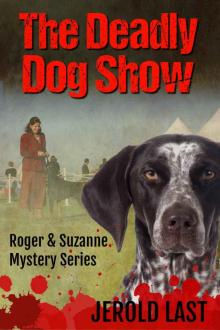 The Deadly Dog Show (Roger and Suzanne South American Mystery Series Book 6)
The Deadly Dog Show (Roger and Suzanne South American Mystery Series Book 6)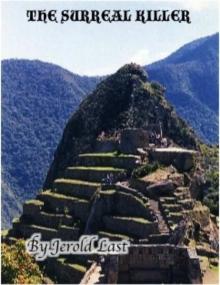 The Surreal Killer (Roger and Suzanne South American Mystery Series Book 2)
The Surreal Killer (Roger and Suzanne South American Mystery Series Book 2) The Body in the Bed (Roger and Suzanne South American Mystery Series Book 5)
The Body in the Bed (Roger and Suzanne South American Mystery Series Book 5)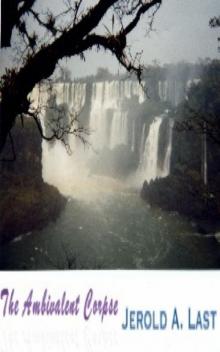 The Ambivalent Corpse (Roger and Suzanne South American Mystery Series Book 1)
The Ambivalent Corpse (Roger and Suzanne South American Mystery Series Book 1)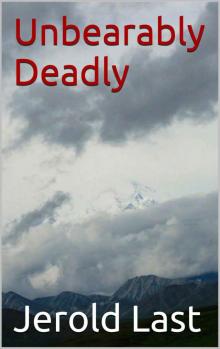 Unbearably Deadly (Roger and Suzanne South American Mystery Series Book 9)
Unbearably Deadly (Roger and Suzanne South American Mystery Series Book 9)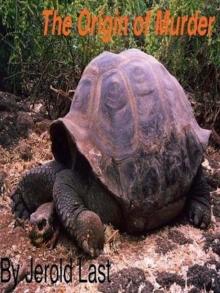 The Origin Of Murder (Roger and Suzanne South American Mystery Series Book 8)
The Origin Of Murder (Roger and Suzanne South American Mystery Series Book 8)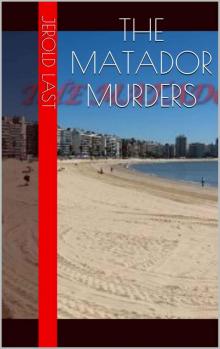 The Matador Murders (Roger and Suzanne South American Mystery Series Book 4)
The Matador Murders (Roger and Suzanne South American Mystery Series Book 4)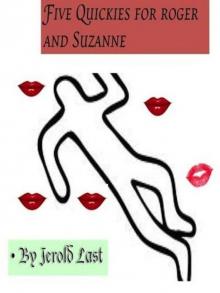 Five Quickies For Roger And Suzanne (Roger and Suzanne South American Mystery Series Book 7)
Five Quickies For Roger And Suzanne (Roger and Suzanne South American Mystery Series Book 7)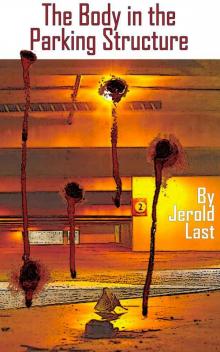 The Body in the Parking Structure (Roger and Suzanne South American Mystery Series Book 4)
The Body in the Parking Structure (Roger and Suzanne South American Mystery Series Book 4)